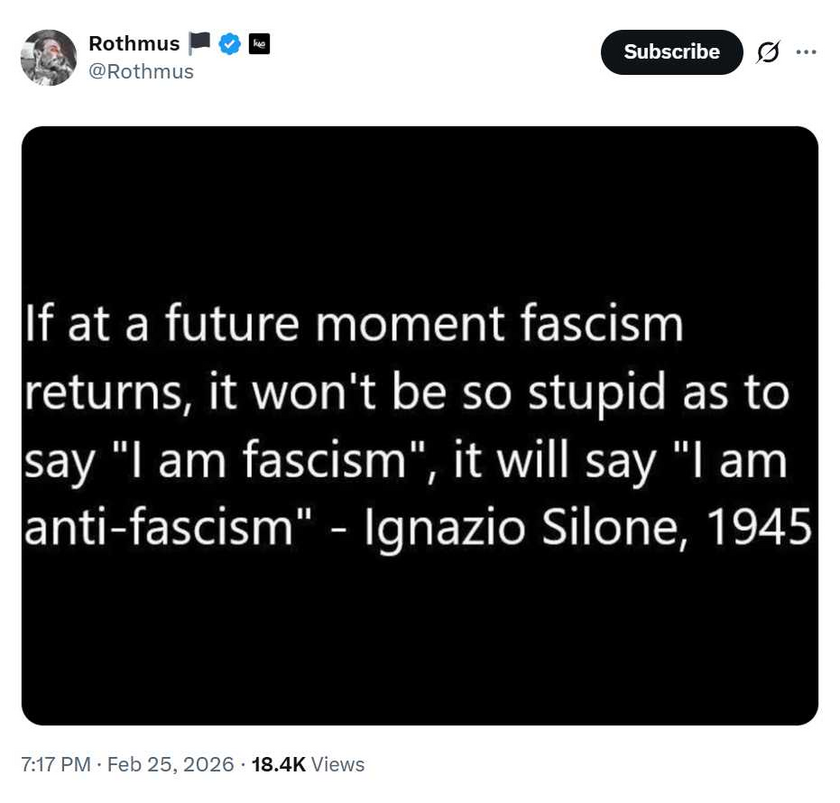“Communism is the riddle of history solved, and it knows itself to be this solution.” –Karl Marx, Economic and Philosophic Manuscripts of 1844
As you can see, according to Karl Marx, Communism, true and proper, is the self-conscious solution to “the riddle of history.” Of course, in reality, where things have to work, there is no riddle of history. The “riddle of history” Marx referred to is, in fact, dialectical anthroposophy (which is a really fancy word for man-centered heretical nonsense), thus any claim upon a solution to that riddle is pure pretense and dangerous hubris. The true solution to the riddle of history, if we should even allow such a phrase, must begin with the outright rejection of Communism and the dialectical framing in which the riddle is posed in the first place, including the underlying assumption that History has a purpose and is thus a riddle to be solved.
Karl Marx did not reject that assumption, however; he began with it. What, to Marx, was the riddle of history, solved, other than just to say “Communism,” as described above? It’s socialism that can produce, that can “deliver the goods,” one might say. Productive socialism that allows Man to escape toil, exploitation, suffering, and work, which arrives when Man is freed from the existence of private property and thus the division of labor, which was his Fall, is the pathway to the “transcendence of private property as human self-estrangement,” as Marx had it. The problem is that “productive socialism” is a functional oxymoron.
The history of the twentieth century is basically the story of productive socialism not existing, either in reality or in actuality (these are different to Marxists). So far, all bids to create it have fallen flat on their faces, universally after starving and people by the millions in the pretense of having finally got it right—or, at least good enough for government work. The reason is straightforward: history is not a riddle, and the dialectic in which it is framed as such is bogus and ultimately a power grab for people who do not know how to wield power. We therefore have every reason to expect the newest “solution” to the “riddle of history,” which believes that it knows itself to be that solution, is going to fail and do a ton of avoidable damage so long as we keep giving it any countenance. Utter failure has never slowed a Communist down, however, so they’re doing what they always do when confronted with failure: keeping their bogus product the same while giving its branding a face-lift.
The fancy, new-fangled “solution” to the non-existent “riddle of history” therefore now tends to go by the name “sustainability,” or more specifically, “sustainable capitalism.” In sustainable capitalism, the economy will be “circular,” and “you will own nothing, and you will be happy.” We’ve heard this kind of talk before, always from the mouths of the emissaries of Mordor. It’ll be great, a “better future” that is both “sustainable and inclusive.” Our systems will be more “resilient,” and we won’t waste so much because we’ll be reusing most of our waste. Didn’t you see the video of Bill Gates smiling as he drank a glass of water pressed out of human sewage? We’ll eat far less meat and, one presumes, far more soy and bugs. Western values like individual liberty and the ownership of private property will hit their breaking points and be abolished, and the United States will no longer be the world’s superpower because room has to be made for China and a new mirror-image supranational West governed by the United Nations. Most importantly, this whole scam will be “sustainable” for the planet we live on, the people we live among, and, even more most importantly, for the Regime that administers it for us. That’s the rub, too. We’ll need someone to administer this unnatural, nonsensical, expensive crap for as long as it lasts because in that Marx was wrong about us being a “species-being” who has forgotten his true nature, nobody is going to sign up for or maintain this disaster for themselves willingly.
Lenin understood this. That was the point of his vanguard strategy, which he located in the Bolshevik Party. Thanks to the need to administer the proposed solution to the riddle of history, you may have heard of sustainable capitalism referred to by another name, “stakeholder capitalism.” That’s adorable. Lenin would smile. Administration of the sustainable capitalism has to be done by a council of expert stakeholders who, in their greater wisdom and perspicacity, make sure all the real stakeholders’ stakes are accounted for, after being passed through the supremely informed and equitable filter of their claim to expertise. That’s why it was called the Soviet Union, don’t you know? The Russian word for the deciding “council” is совет—Soviet, as it gets rendered in English. The совет акционеров, the stakeholders’ council, will administer the sustainable capitalism that us rubes are too dumb and selfish to produce and maintain for ourselves.
Where sustainable capitalism is the solution to the so-called riddle of history, stakeholder capitalism is little more than its mechanism of implementation. Phrased more historically, where sustainable capitalism “is the riddle of history solved” and “the positive transcendence of private property,” to riff from Karl Marx, stakeholder capitalism is the supranationalist Leninist-style vanguard program that will implement it for us—rather, on us. That is, because we won’t be sustainable in the right sense by ourselves, our elite betters are going to have to implement it upon us for us—for the greater good of all. Though we can only speculate, this might be why Klaus Schwab, alleged father of the stakeholder capitalism model, has a bust of none other than Vladimir Lenin on the bookshelf in his office. In other words, stakeholder capitalism being offered as the vehicle to sustainable capitalism is just further proof that this whole giant socioeconomic Ponzi scheme is going to fail catastrophically. It actually gives away the game that they’ve tucked away and hidden inside of a fancy new Western technofuturist box.
What we’ve already realized, however, is that there’s another term that could pass equally well for what is meant by “sustainable capitalism,” understood as “the riddle of history solved.” That term would be productive socialism, which, if administered long and hard enough, will result in the People undergoing the positive transcendence of private property as human self-estrangement as they remember that they are and always were Communists in their essential being. That’s what Marx characterized it as. Communism, as he had it, is “the true resolution of the strife between existence and essence, between objectification and self-confirmation, between freedom and necessity, between the individual and the species.” The problem is that through the “inversion of praxis,” which is how the existing society allegedly brainwashes people into accepting its terms and thus reproducing it, people can’t solve the riddle of history. They have had the wrong values “introjected” into them through the inversion of praxis, as it was phrased in 1969 by the Critical Marxist Herbert Marcuse in his infamous Essay on Liberation. They need to be freed from those and have new values—a New Sensibility—introjected into them instead so that they can establish a true (biological) foundation for socialism.
This, “productive socialism,” is what they pretend to have in China under the CCP now. Communist China can be looked at as the test-run for this brilliant new global scam. They introject the correct values into the population not only through the usual old-fashioned methods like 鬥爭 (dòuzhēng, struggle) and 洗腦 (xǐnǎo, brainwashing) but also through forced compliance with a pervasive social credit system that makes you behave, shall we say, productively and sustainably. The Marxist doctrine of the inversion of praxis instructs that if you force people to live and practice the new values system, eventually it will determine their character. They will become socialists by being forced to live as socialists.
This is easily enough said, but how did it get here? The case for my claim—that “sustainable capitalism” and “productive socialism” are synonyms—derives from my reading of the leading Critical Marxist Theorist of the 1960s, Herbert Marcuse. Particularly, in my view, the second and ninth chapters of his magnum opus, titled One-dimensional Man and published in 1964, constitute the conceptual bedrock for the development of “sustainable capitalism,” and that this concept represents nothing more than a West-palatable brand name for what would be more honestly called productive socialism. I think this book rephrases the so-called riddle of history while never admitting the slightest doubt that “socialism” might not be its solution. Of course, in the religion of Marxism, questioning the completion of History as truly transcendent capitalism (which resolves the Fall of Man as the division of labor) is roughly the same as asking a Christian to doubt the Resurrection (which resolves the Fall of Man as the Sin of Adam). It’s not going to happen.
In One-dimensional Man, which reached and influenced hundreds of thousands, if not millions, of Leftists in the 1960s and 1970s—Leftists who went on to become your college professors and your kids’ teachers’ college professors, among other world-building professionals—Marcuse wrestles with a number of mid-century challenges to the sputtering Marxist sophistry, which was barely chugging along on fumes everywhere outside of East Asia and, to a degree, Latin America. Prominent among them, and essentially the thesis of his second chapter, is the dialectical relationship between capitalism in the West and socialism in the East (and South). What that means is that capitalism and socialism are in some obscure sense the same thing viewed in different, incorrectly opposing lights. Both are partial answers to the riddle of history, which finds its solution on a higher plane of understanding that synthesizes them both into a single program. Putting capitalism and socialism in a dialectical relationship, in fact, might have been Marcuse’s most significant contribution to Leftist thought because it, in a sense, poses the two great warring systems as two key insights to the so-called riddle of history.
For Marcuse, part of the solution exists in what he sees as the chief problem of capitalism. The problem is that capitalism “delivers the goods.” It enables the middle class to rise and the worker to have a good life that he enjoys. He has stuff. He isn’t hungry or cold. He isn’t miserable. Though he is allegedly still exploited, he’s conditioned by the goodness of his life (the inversion of praxis) to accept and even enjoy it—and, he admits, it’s absolutely true that his life is a good life. That makes him “one-dimensional” and completely ruins his revolutionary potential. To be a revolutionary, the worker has to be radicalized by making him miserable through the abuses of monopoly-capital and exploiting that misery. “Advanced capitalism,” as Marcuse called it, had fairly effectively put a stop to these abuses, thus flattening Man and conditioning him to accept and even love his largely meaningless and static one-dimensional workaday-consumerist life.
For Marcuse, the working class was removed from his historical position as a revolutionary base by this evil success of advanced capitalism, so much so that he insisted that a new working class would need to be found through identity politics, racial, sexual, feminist, and more, led by the more easily programmed college students (Mao preferentially xǐnǎo-ed the youth too, and Marcuse knew it). In Marcuse’s telling, besides flattening Man and thus locking his essential nature (as a socialist) away from his consciousness, this successful dimension of capitalism creates an impending disaster of excess. Capitalism delivers the goods, but it turns people into relentless consumers whose needs multiply as fast as they can be satisfied. Meanwhile, in his telling, it profiteers off deliberately wasteful practices like planned obsolescence and the destruction of the limited natural environment. Capitalism works, in Marcuse’s dialectical view of it, but it works too well and simply isn’t sustainable.
On the other hand of the grand riddle of history, socialism has the right view of things, the right sensibility, argues Marcuse, but it’s a dump. Socialist nations were undeniable shitholes—in fact, far worse than that because they were brutally totalitarian and abusive. Marcuse pinned these failures on the abuses of bureaucracy and their tyrants, but those in turn were, to him, the result of a specific problem that Marxists of his era didn’t know how to solve. That problem is sometimes called the problem of production. Stated simply, socialist societies can’t produce. They cannot even manage to meet the basic needs of their people, and in their mounting failure to be able to produce, they become brutal. Socialism, for Marcuse, has it right, but it doesn’t work. If it did work, it would be both productive and sustainable, and the people would be happy.
That “riddle of history,” which I will insist defined Marxist Leftism (a redundancy, frankly) in the tumultuous 1960s and stagnating 1970s, was the framing in which stakeholder capitalism and the notion of a “sustainable and inclusive” future emerged, I believe. The Soviet Union, for all its might, was toast, so the model was tested first in China. It developed not under Mao Zedong—though important meetings between leaders like him, Richard Nixon, and Henry Kissinger proceeded, perhaps to that theme—but under his successor Deng Xiaoping, who rose to Chairman of the CCP within a couple of politically tumultuous years following Mao’s death in September 1976.
The “productive socialism” experiment, as it might now be called, was to open up restricted markets within China and Chinese industry to Western markets. “I don’t care if the cat is black or white, so long as it catches mice,” Deng famously remarked, so why not experiment with a markets-driven solution to the problem of production? In some sense, it worked. China was rapidly enriched and went from being a broken, backwards, and extremely populous nation with an economy roughly the size of Italy’s to a global financial superpower in just a few decades. They had, it seemed, cracked the code on productive socialism.
The trick, it seemed, was to open up quasi-capitalist markets like little controlled terrariums inside the socialist architecture of the command-driven Communist state. The trick, in reality, was probably little more than turning that humongous, impoverished, and easily exploitable population base into a gigantic manufacturing base for Western consumer goods, which is only good so long as it lasts. (The check might be coming due on this now, for what it’s worth.)
If the model could work in China, why not in the West—and thus, in some sense, everywhere? The West, obviously, would naturally fall behind the rising command-economy behemoth in the East if it didn’t transform as well, right? That makes for one hell of a sales pitch, one that many of our Western elites seem to have bought hook, line, and sinker. To get productive socialism in the West, especially in the United States, where socialism is largely anathema, what changes would be needed there?
Herbert Marcuse told us. You’ll definitely need a radicalized youth that believes it can’t even live without socialism, and getting one of those is as simple a matter, more or less, as getting hold of the education system and disrupting family, faith, and national identity. More would be needed, too, though. A right understanding of capitalism, the basis of the West, that synthetically moves it toward “productive socialism” would also be needed.
Again, to believe Herbert Marcuse on the issue, the problem with Western capitalism wasn’t that it couldn’t produce; it’s that it isn’t sustainable. The problem of advanced capitalism isn’t production and the satisfaction of needs, argues Marcuse; it’s overproduction and thus the insatiable production of newer and newer false needs. “In the contemporary era, the conquest of scarcity is still confined to small areas of advanced industrial society. Their prosperity covers up the Inferno inside and outside their borders; it also spreads a repressive productivity and ‘false needs,’” he tells us.
What’s to be done about these “false needs” generated by the excessive successes of advanced capitalism? Says, Herr Marcuse, “The process always replaces one system of preconditioning by another; the optimal goal is the replacement of false needs by true ones, the abandonment of repressive satisfaction.” Of course, consciousness (the Marxists’ Gnostic counterfeit of Christian discernment and Greek wisdom) is needed to distinguish the two. True needs are the actual basic needs of life, not more, which a government of productive socialism should provide thus liberating Man from needing to provide them for himself. False needs, on the other hand, can be identified through critical consciousness as well, however.
We may distinguish both true and false needs. “False” are those which are superimposed upon the individual by particular social interests in his repression: the needs which perpetuate toil, aggressiveness, misery, and injustice. Their satisfaction might be most gratifying to the individual, but this happiness is not a condition which has to be maintained and protected if it serves to arrest the development of the ability (his own and others) to recognize the disease of the whole and grasp the chances of curing the disease. The result then is euphoria in unhappiness. Most of the prevailing needs to relax, to have fun, to behave and consume in accordance with the advertisements, to love and hate what others love and hate, belong to this category of false needs.
So much for relaxing and having fun in the socialist utopia, comrades! That’s not all, though! “Liberation of energy from the performances required to sustain destructive prosperity,” advises Marcuse in the ninth chapter of One-dimensional Man, “means decreasing the high standard of servitude in order to enable the individuals to develop that rationality which may render possible a pacified existence.” It “also presupposes reduction in the future population,” he points out in the next sentence (written in 1964 when the population was roughly half what it is today), but let’s not digress into the uncomfortably obvious. To achieve the parallel of productive socialism in the West, capitalism would have to be modified to free up the “energy…required to sustain destructive prosperity,” and the denizens of Western capitalistic nations would have to accept generally a lower standard of living (and smaller population). In other words, capitalism would have to be made sustainable (and inclusive). So we’re back to the socialist shitholes, but in the new sustainable ones, you’ll be happy, not merely comfortable, relaxed, and euphoric.
I believe “sustainable (and inclusive) capitalism” is little more than the capitalist-side solution to this false riddle of history posed in 1964 by Herbert Marcuse, and that it knows—rather, believes—itself to be this solution. The “productive socialism” of China under the hybrid system currently run by the CCP is the socialist-side solution to the same, and, in fact, these two are not significantly different in any noteworthy way. These two, sustainable capitalism and productive socialism, are the two great systems dialectically reframed as part of a greater whole: the impending shithole world of the New World Order. Thus, in China the Communism is on the outside and the fascistic market structure is contained within to produce “productive socialism,” and in the West, perhaps mostly due to some combination of marketing constrains and dialectical wizardry, the fascistic “public-private partnership” is on the outside with the “equitable and inclusive” redistribution scheme hidden within. This, though is a distinction without much difference. Both are in a position for ultimate synthesis into the great tyranny of the twenty-first century. In a bizarre twist of ironic inversion, the Chinese model will be the nationalistic one. The West will not be allowed to be so lucky.
Karl Marx said of the true sort of Communism that it is “the riddle of history solved, and it knows itself to be the solution,” and this is characterized by “the positive transcendence of private property as human self-estrangement, and therefore as the real appropriation of the human essence by and for man; communism therefore as the complete return of man to himself as a social (i.e., human) being.” Sustainable capitalism phrases this more plainly: “you will own nothing, and you will be happy.” Marx said about it that it, “as fully developed naturalism, equals humanism, and as fully developed humanism equals naturalism; it is the genuine resolution of the conflict between man and nature and between man and man.” The sustainable capitalists explain that it’s environmentally and socially responsible, or sustainable and inclusive. Inclusion as a Communist ideal is obvious, of course, but what about (environmental) sustainability? Karl Marx explained this too, though a bit more abstrusely,
Just as plants, animals, stones, air, light, etc., constitute theoretically a part of human consciousness, partly as objects of natural science, partly as objects of art—his spiritual inorganic nature, spiritual nourishment which he must first prepare to make palatable and digestible—so also in the realm of practice they constitute a part of human life and human activity. Physically man lives only on these products of nature, whether they appear in the form of food, heating, clothes, a dwelling, etc. The universality of man appears in practice precisely in the universality which makes all nature his inorganic body—both inasmuch as nature is (1) his direct means of life, and (2) the material, the object, and the instrument of his life activity. Nature is man’s inorganic body—nature, that is, insofar as it is not itself human body. Man lives on nature—means that nature is his body, with which he must remain in continuous interchange if he is not to die. That man’s physical and spiritual life is linked to nature means simply that nature is linked to itself, for man is a part of nature.
In estranging from man (1) nature, and (2) himself, his own active functions, his life activity, estranged labour estranges the species from man. It changes for him the life of the species into a means of individual life. First it estranges the life of the species and individual life, and secondly it makes individual life in its abstract form the purpose of the life of the species, likewise in its abstract and estranged form. (EPM)
We—as a collective—are nature, apparently. We, as individuals, sunder ourselves from nature, both as nature itself and as the necessary window into our true human natures—as Communists. Sustainable capitalism managed by Klaus Schwab’s совет акционеров, a.k.a. “stakeholder capitalism,” allows the properly conscious to remedy this primordial Marxist evil, and it knows itself to be the solution.
So, I think I’ve made my case. Karl Marx instructed in 1844 that the true Communism is the self-conscious solution to the riddle of history, and Herbert Marcuse 120 years later framed the riddle of history for the stage of “advanced capitalism” and faltering socialism to be how to synthesize them into a single functional system. While “productive socialism” is not a term in the common use, its Western brand name, “sustainable capitalism” is. These are not different, however. They’re both approximately the same new iteration of Communism, a Neo-Communism based on Marcusian Neo-Marxism instead of Marxian Marxism.
The whole thing is a scam, and it will do incalculable damage if we allow it. We don’t have to allow it, though. We have a choice. We can understand what we’re dealing with beneath the jargon and slick branding, and we can say no. Marcuse said that overcoming the tyranny of the system he hated required what he called a Great Refusal—“the protest against that which is”—and to that much, I say yes. We can refuse this scam, whether we call it “sustainable capitalism” or “productive socialism” (which is an oxymoron) and get back to living history as it unfolds instead of falling on our faces by thinking its a riddle we can or should solve.


















